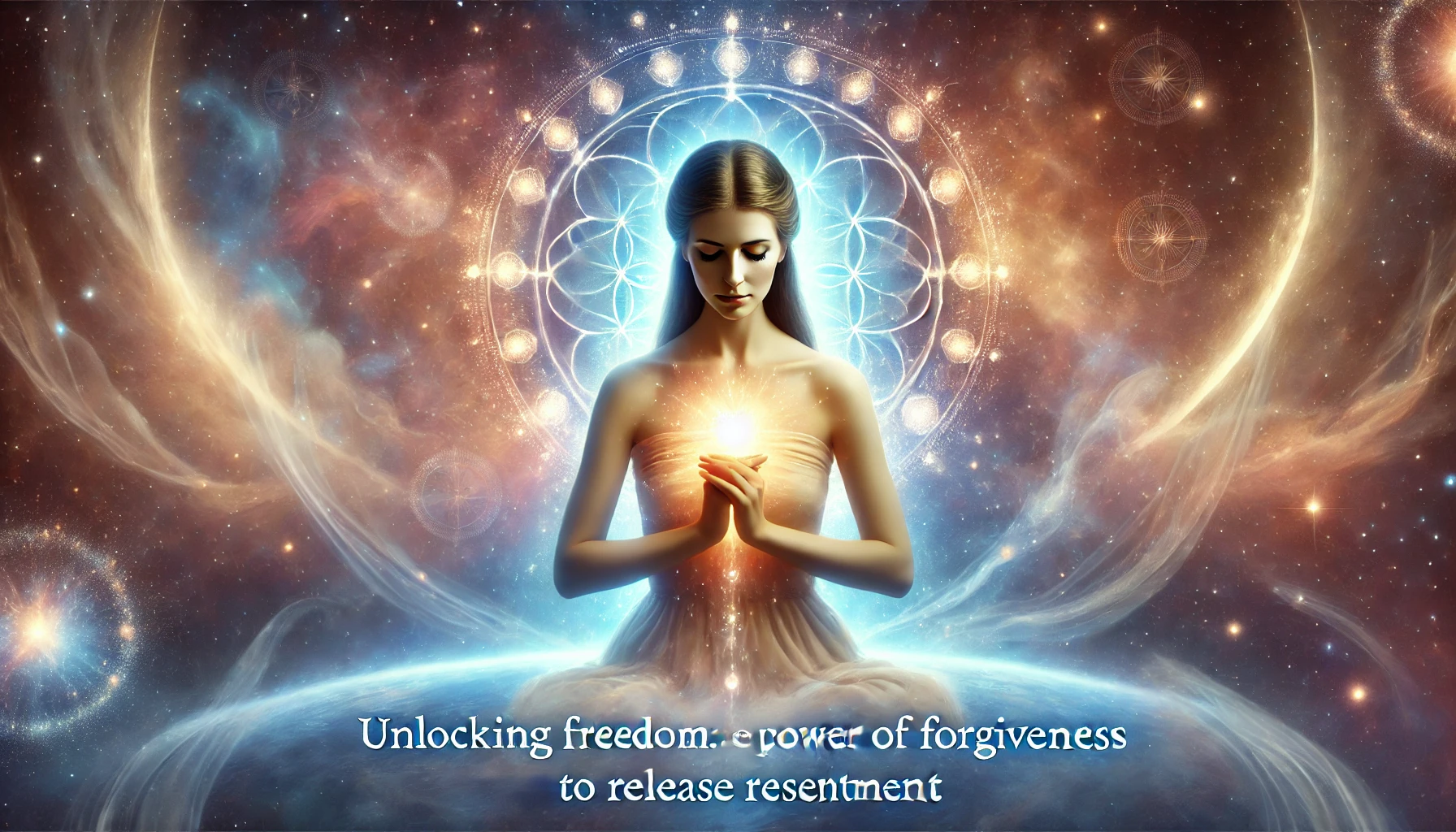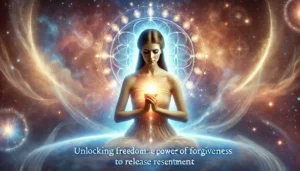
Unlocking Freedom: The Power of Forgiveness to Release Resentment
Introduction to the Power of Forgiveness
Forgiveness is a powerful tool that can help free us from the burden of resentment and pain. Holding onto grudges and anger can weigh us down, affecting our mental, emotional, and even physical well-being. However, through forgiveness, we can release these negative emotions and find peace within ourselves.
Forgiveness does not mean excusing the actions of others or forgetting the hurt they may have caused us. Instead, it is about letting go of the negative emotions tied to those experiences and choosing to move forward without carrying the weight of resentment on our shoulders.
- When we forgive, we are giving ourselves the gift of freedom from the past.
- We are no longer stuck in a cycle of anger and bitterness, but rather can open ourselves up to healing and growth.
- Forgiving others can be a difficult process, but the benefits for ourselves are immeasurable.
- It is an act of self-love and compassion that allows us to break free from the chains of resentment and pain.
Through this guide, we will delve deeper into the meaning and benefits of forgiveness, as well as explore strategies and techniques for cultivating a mindset of forgiveness in our everyday lives. By harnessing the power of forgiveness, we can let go of the past and create a brighter, more peaceful future for ourselves.
Understanding What Forgiveness Really Means
Forgiveness is a concept that we often hear about, but do we truly understand what it means? Forgiveness is not simply about excusing someone for their actions or pretending like nothing ever happened. It goes much deeper than that. Forgiveness is about letting go of resentment and anger towards someone who has hurt you. It is about releasing the negative emotions that are weighing you down and preventing you from moving forward.
When you forgive someone, you are not saying that what they did was okay or accepting their behavior. Instead, forgiveness is a conscious decision to free yourself from the pain and emotional burden that you have been carrying. It is a choice to stop allowing the actions of others to control your thoughts and feelings. Forgiveness is an act of self-care and self-love.
- Finding peace: Forgiveness allows you to find peace within yourself. It liberates you from the cycle of negativity and allows you to focus on the present moment.
- Letting go: By forgiving, you are letting go of the power that the person who hurt you holds over you. You are reclaiming your own power and control over your life.
- Healing: Forgiveness is a form of emotional healing. It allows you to release built-up resentment and pain, leading to a sense of relief and emotional freedom.
It is important to understand that forgiveness is a process. It may not happen overnight, and it may require time and effort on your part. Forgiveness does not mean forgetting or condoning harmful behavior. It means choosing to release the negative emotions that are holding you back. It is about taking care of yourself and prioritizing your own well-being.
Remember, forgiveness is not a sign of weakness but rather a sign of strength. It takes courage to let go of past hurts and move forward with an open heart. By understanding what forgiveness truly means, you can begin to harness its transformative power in your own life.
Exploring the Benefits of Practicing Forgiveness for Yourself
Forgiveness is not just about letting go of resentment towards others; it also provides immense benefits for your own well-being. When you choose to forgive, you are ultimately choosing to free yourself from the burden of carrying around pain and anger.
One of the key benefits of practicing forgiveness is the reduction of stress and anxiety. Holding onto anger and grudges can take a toll on your mental and physical health, leading to heightened levels of stress. When you forgive, you are releasing that tension and allowing yourself to experience a sense of peace and calm.
Moreover, forgiveness can also lead to improved relationships with others. As you let go of anger and resentment, you open up space for more positivity and connection in your interactions with others. This can foster deeper and more meaningful relationships in your life.
Practicing forgiveness also allows you to break free from the chains of the past. Holding onto grudges can keep you stuck in a cycle of pain and resentment, preventing you from moving forward and reaching your full potential. By forgiving, you are giving yourself the opportunity to heal and grow beyond past hurts.
Additionally, forgiveness can enhance your overall mental well-being. Letting go of negative emotions can help improve your mood and outlook on life. It can also boost your self-esteem and sense of self-worth, as you learn to show compassion and kindness towards yourself and others.
- Fewer stress and anxiety.
- Improved relationships with others.
- Break free from the past.
- Enhance mental well-being.
Overall, practicing forgiveness is a powerful act of self-care that can positively impact every aspect of your life. By choosing to forgive, you are choosing to prioritize your own well-being and step into a more peaceful and fulfilling existence.
How to Overcome Resistance and Let Go of Grudges
Let’s face it, letting go of grudges and forgiving someone who has hurt us can be incredibly challenging. Our natural tendency is to hold onto anger and resentment, replaying the hurtful events over and over in our minds. But carrying around this emotional baggage only weighs us down, causing more pain and suffering in the long run.
So how can we overcome the resistance to forgiveness and free ourselves from the burden of grudges?
- Shift your perspective: Instead of focusing on the wrongdoing or betrayal, try to see things from the other person’s point of view. Maybe they were acting out of fear or pain themselves. This doesn’t excuse their behavior, but understanding their perspective can help soften your heart towards them.
- Practice empathy: Put yourself in the other person’s shoes and imagine what they might be going through. Empathy allows us to see that we are all flawed human beings capable of mistakes and errors in judgment.
- Release expectations: Holding onto expectations of how someone “should” behave or what they “should” do to make amends only prolongs the cycle of resentment. Let go of these expectations and focus on what you can do to find peace within yourself.
- Focus on your own healing: Remember that forgiveness is not just about letting the other person off the hook; it’s about releasing yourself from the emotional prison of anger and bitterness. By forgiving, you are choosing to prioritize your own well-being and emotional health.
- Practice self-care: Take care of yourself during this difficult process. Engage in activities that bring you joy and fulfillment, such as meditation, exercise, or spending time with loved ones. Self-care is essential for maintaining your emotional strength and resilience.
Remember, forgiveness is a process, not a one-time event. It may take time and effort to fully let go of grudges and embrace forgiveness, but the benefits far outweigh the challenges. By choosing to forgive, you are not only freeing yourself from resentment and pain, but also opening the door to healing and new possibilities in your relationships and personal growth.
Unpacking the emotional healing that comes with forgiving others
Forgiveness is not just about letting go of anger towards someone who has wronged you. It goes beyond that – it involves healing emotional wounds and finding peace within yourself. When you choose to forgive others, you are making a conscious decision to release the negative emotions that have been weighing you down. It may seem difficult at first, but the benefits of forgiveness are profound.
- Release of Resentment: Holding onto resentment can be like carrying a heavy burden on your shoulders. When you forgive someone, you are freeing yourself from the weight of that resentment and giving yourself a chance to experience true emotional freedom.
- Emotional Healing: Forgiveness allows you to heal the emotional wounds that have been caused by the hurtful actions of others. By letting go of negative emotions such as anger and bitterness, you open yourself up to experiencing inner peace and emotional healing.
- Improved Mental Health: The act of forgiveness has been linked to improved mental health outcomes, including reduced symptoms of anxiety and depression. When you forgive others, you are taking care of your own mental well-being and promoting positive emotions within yourself.
Understanding that forgiveness is a process, not an event, can help you navigate through the emotional healing that comes with forgiving others. It may take time, patience, and self-reflection, but the rewards of practicing forgiveness are well worth the effort. Remember, forgiveness is not about excusing or forgetting what happened – it’s about letting go of the negative emotions that are holding you back and embracing a healthier mindset.
Strategies for Cultivating Compassion and Empathy in Order to Forgive
Forgiveness is a powerful tool that can help us release the burden of resentment and pain that we carry within us. However, it’s not always easy to forgive, especially when we are hurt or wronged by someone. One of the keys to unlocking the power of forgiveness is cultivating compassion and empathy towards the person who has hurt us.
Here are some strategies to help you cultivate compassion and empathy in order to forgive:
- Practice putting yourself in their shoes: Try to see things from the other person’s perspective. What might have led them to act the way they did? Understanding their motivations and struggles can help you cultivate empathy towards them.
- Practice mindfulness: Mindfulness can help you stay present and aware of your own emotions without reacting impulsively. This can help you respond to the situation with more compassion and understanding.
- Seek to understand rather than judge: Instead of judging the person who hurt you, try to understand why they did what they did. Was it out of fear, insecurity, or pain? Understanding their reasons can help you feel more compassionate towards them.
- Practice self-compassion: It’s important to also show compassion towards yourself. Forgiving others can be difficult, and it’s okay to struggle with it. Be gentle with yourself and acknowledge your own emotions and pain.
- Practice gratitude: Reflect on the positive aspects of your life and the blessings you have. Gratitude can help shift your focus away from anger and resentment towards a more compassionate mindset.
Cultivating compassion and empathy takes time and practice, but it is a crucial step towards embracing the power of forgiveness. By viewing the person who hurt you with compassion and empathy, you can open the door to healing and release yourself from the chains of resentment and pain.
The Role of Self-Forgiveness in the Process of Healing
Forgiving oneself is often more challenging than forgiving others, but it plays a crucial role in the process of healing. Many times, we are our own harshest critics, holding onto guilt and shame for past mistakes or shortcomings. However, self-forgiveness is essential for moving forward and releasing the emotional burden that weighs us down.
When we hold onto self-blame and resentment towards ourselves, we hinder our ability to fully heal and grow. It’s important to remember that we are all human, and making mistakes is a natural part of life. By practicing self-forgiveness, we can let go of the negative thoughts and emotions that hold us back from experiencing true peace and happiness.
- Acceptance: Self-forgiveness begins with accepting that you are not perfect and that it is okay to make mistakes. This does not make you any less worthy or lovable.
- Compassion: Treat yourself with the same kindness and compassion that you would offer to a friend who is struggling. Be gentle with yourself as you navigate through your journey of forgiveness.
- Release: Let go of the need to punish yourself for past actions. Holding onto guilt and shame only perpetuates feelings of unworthiness and keeps you stuck in a cycle of self-destructive behavior.
By forgiving yourself, you give yourself permission to move forward with clarity, purpose, and self-compassion. Remember that you deserve forgiveness just as much as anyone else, and allow yourself to embrace the healing power that comes with self-forgiveness.
Addressing Common Myths and Misconceptions about Forgiveness
Forgiveness is often misunderstood and misconstrued by many people. Let’s address some common myths and misconceptions about forgiveness to help you better understand its true power:
- Myth: Forgiveness means you have to forget what happened.Forgiveness does not mean forgetting the hurt that was caused. It means accepting what happened, letting go of the negative emotions attached to it, and moving forward without holding onto grudges.
- Myth: Forgiveness is a sign of weakness.In reality, forgiving someone takes strength and courage. It requires you to confront your pain, let go of anger, and choose to move past the hurt in order to heal and grow.
- Myth: Forgiveness condones the wrong behavior.Forgiving someone does not mean excusing or justifying their actions. It simply means releasing yourself from the emotional burden of holding onto anger and resentment towards them.
- Myth: You have to wait for an apology to forgive.While receiving an apology may help facilitate forgiveness, it is not necessary for you to forgive someone. You can choose to forgive for your own peace of mind, even if the other person does not acknowledge their wrongdoing.
- Myth: Forgiveness is a one-time event.Forgiveness is a process that may take time and effort. It is not always easy, and you may find yourself revisiting and working through your feelings multiple times before fully letting go of the pain.
Understanding and addressing these myths and misconceptions can help you embrace the true power of forgiveness and experience the freedom and healing it offers.
Practical Tips for Practicing Forgiveness in Your Everyday Life
Forgiveness is not always easy, and it can be a journey that takes time and effort. Here are some practical tips to help you incorporate forgiveness into your daily life:
- Start with yourself: Before you can forgive others, it’s important to work on forgiving yourself. Acknowledge your mistakes and shortcomings, then practice self-compassion and understanding.
- Practice empathy: Put yourself in the other person’s shoes to help you understand their perspective and motivations. This can make it easier to let go of resentment and anger.
- Communicate openly: If you’re struggling to forgive someone, consider having an honest conversation with them. Express your feelings and listen to their side of the story. Communication can help you both heal and move forward.
- Set boundaries: Forgiving someone doesn’t mean you have to forget what they’ve done or continue allowing them to hurt you. It’s okay to set boundaries to protect yourself while still working on forgiveness.
- Practice mindfulness: Stay present in the moment and focus on your thoughts and emotions. Mindfulness can help you recognize negative feelings like anger and resentment, and choose to release them.
- Seek support: Forgiveness can be a challenging process, and it’s okay to seek help from a therapist, counselor, or support group. Talking to others can provide insight, encouragement, and new perspectives.
Remember, forgiveness is a personal journey, and it’s okay to take your time and progress at your own pace. Celebrate small victories along the way, and be gentle with yourself as you navigate this transformative process. With patience and dedication, you can free yourself from resentment and pain, and experience the healing power of forgiveness.
Building Resilience Through Forgiveness
When we think about resilience, we often picture the ability to bounce back from adversity or challenges. Forgiveness is a key element in building resilience because it helps us let go of past hurts and move forward with strength and courage.
- Finding Strength in Forgiveness: Forgiving others can be a powerful way to build resilience by releasing the negative emotions that hold us back. When we forgive, we free ourselves from the burden of carrying grudges and resentments, allowing us to channel our energy into more positive endeavors.
- Embracing Growth and Learning: Forgiveness teaches us important lessons about empathy, understanding, and acceptance. By letting go of anger and embracing forgiveness, we open ourselves up to personal growth and development, leading to greater resilience in the face of future challenges.
- Resilience in Relationships: Forgiveness is also essential for building resilience in relationships. By practicing forgiveness and letting go of past grievances, we strengthen our connections with others and create a more supportive environment in which we can weather any storms that come our way.
It’s important to remember that forgiveness is not a sign of weakness, but rather a testament to our inner strength and resilience. It takes courage to forgive, especially when faced with deep emotional wounds. However, by embracing forgiveness, we empower ourselves to overcome adversity and thrive in the face of life’s challenges.
As you journey towards building resilience through forgiveness, remember to be patient and kind to yourself. Healing takes time, and forgiveness is a process that may require practice and dedication. Be gentle with yourself as you navigate the complexities of forgiveness, and know that each step you take towards letting go of resentment and pain brings you closer to a brighter, more resilient future.
By harnessing the power of forgiveness, you can strengthen your resilience and open the door to a more peaceful and fulfilling life.
Healing Relationships Through the Power of Forgiveness
Our relationships with others play a significant role in our overall well-being. When conflicts arise and tensions build, it can create feelings of anger, resentment, and pain. However, by harnessing the power of forgiveness, we have the opportunity to heal those relationships and create space for growth and connection.
Forgiveness is not about excusing or condoning hurtful behavior. It is about releasing yourself from the burden of holding onto negative emotions that only serve to weigh you down. By choosing to forgive, you are not only freeing the other person from your resentment, but you are also freeing yourself from the shackles of bitterness.
- Communicate openly and honestly with the other person. Share your feelings and listen to their perspective without judgment.
- Practice empathy and try to see the situation from the other person’s point of view. Understanding where they are coming from can help foster compassion and forgiveness.
- Acknowledge your own role in the conflict and take responsibility for your actions. Owning up to mistakes can help facilitate the healing process.
Through the act of forgiveness, you have the opportunity to repair and strengthen your relationships. It requires courage, vulnerability, and a willingness to let go of pride. But the rewards are immeasurable – deeper connections, increased trust, and a sense of peace and harmony.
Remember, the journey of forgiveness is not always easy or linear. It may take time, patience, and effort. But with each step you take towards letting go of resentment and embracing compassion, you are paving the way for reconciliation and renewal in your relationships.
By healing relationships through the power of forgiveness, you are not only benefiting yourself, but you are also creating a positive ripple effect that extends to those around you. Embrace forgiveness as a tool for growth, connection, and healing in your relationships.
Conclusion: Reflecting on the transformative power of forgiveness
Forgiveness is a powerful tool that can truly set you free from the burden of resentment and pain. By letting go of grudges and embracing forgiveness, you are not only healing yourself but also creating space for uplifting emotions like compassion and empathy in your life.
When you forgive, you are choosing to release the negative energy that has been holding you back, allowing yourself to move forward with a sense of peace and inner strength. It is a profound act of self-care and self-compassion, as you liberate yourself from the emotional shackles that have bound you for so long.
- Forgiveness doesn’t mean forgetting or excusing the harm done to you. It’s about releasing the hold that past hurt has on you, and choosing not to hold onto grudges that only cause you more pain.
- Practicing forgiveness is a journey that requires patience and commitment. It’s not always easy, but the rewards – peace of mind, emotional healing, and stronger relationships – make it all worth it.
- Remember, forgiving yourself is just as important as forgiving others. Self-forgiveness is a crucial part of the healing process, enabling you to let go of guilt and shame, and embrace self-love and compassion instead.
As you reflect on the transformative power of forgiveness, think about the ways in which it has already impacted your life. Consider the moments of peace and clarity that forgiveness has brought you, and how it has helped you rebuild broken relationships and cultivate resilience in the face of challenges.
By continuing to practice forgiveness in your everyday life, you are not only benefiting yourself but also creating a ripple effect of positivity and healing that extends to those around you. Embrace forgiveness as a tool for personal growth and emotional well-being, and watch as it transforms your life in ways you never thought possible.
FAQs about Harnessing the Power of Forgiveness: Freeing Yourself from Resentment and Pain
-
- Q: What exactly does forgiveness mean?
A: Forgiveness is the act of letting go of resentment and anger towards someone who has wronged you.
-
- Q: How can forgiveness benefit me personally?
A: Practicing forgiveness can lead to emotional healing, lower stress levels, improved relationships, and increased resilience.
-
- Q: How can I overcome my resistance to forgiving someone?
A: Some strategies for overcoming resistance include cultivating empathy, practicing self-forgiveness, and seeking support from others.
-
- Q: Can forgiveness really help to heal relationships?
A: Yes, forgiveness can play a vital role in healing relationships by promoting understanding, compassion, and trust.
-
- Q: Are there any practical tips for incorporating forgiveness into my daily life?
A: Yes, some practical tips include journaling, practicing gratitude, setting boundaries, and seeking therapy or counseling.
-
- Q: How can I build resilience through forgiveness?
A: By practicing forgiveness, you can learn to cope with adversity, bounce back from challenges, and grow stronger emotionally.
-
- Q: Why is self-forgiveness important in the healing process?
A: Self-forgiveness is essential for freeing yourself from guilt, shame, and self-criticism, and allows for personal growth and transformation.
comments: 0




